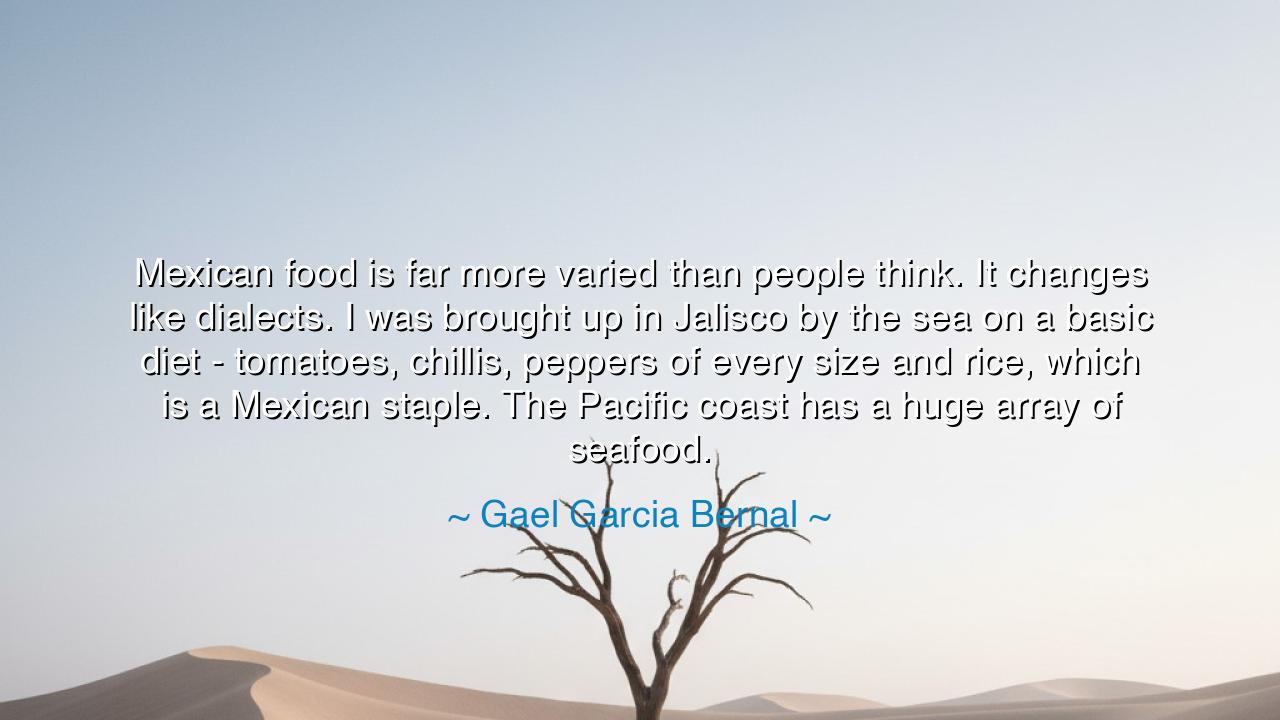
Mexican food is far more varied than people think. It changes
Mexican food is far more varied than people think. It changes like dialects. I was brought up in Jalisco by the sea on a basic diet - tomatoes, chillis, peppers of every size and rice, which is a Mexican staple. The Pacific coast has a huge array of seafood.






When Gael García Bernal said, “Mexican food is far more varied than people think. It changes like dialects. I was brought up in Jalisco by the sea on a basic diet — tomatoes, chillis, peppers of every size and rice, which is a Mexican staple. The Pacific coast has a huge array of seafood,” he was not merely describing cuisine — he was celebrating a living culture, a language of taste and memory carried through generations. His words are not just about food; they are about identity, about how the land, the sea, and the people weave together to form the soul of a nation. In his voice, one hears both pride and reverence — a recognition that food, like speech, evolves with the earth that sustains it and the hearts that remember it.
The origin of his wisdom lies in the geography of Mexico itself — a land of deserts and jungles, mountains and coasts, each with its own rhythm, its own story told through spices and seeds. To say that food “changes like dialects” is to acknowledge that every region speaks with its own culinary accent. In Jalisco, where Gael was raised, the Pacific wind carries the scent of salt and citrus, mingled with the fire of chili and the richness of rice. His childhood diet, simple yet profound, reflects the essence of that coastal life — where abundance is found not in extravagance, but in the harmonious marriage between land and sea.
In the ancient world, food was considered the language of the gods. The Greeks spoke of ambrosia, the food of immortality; the Mayans of maíz, the sacred corn that shaped humanity itself. For the peoples of Mexico, food is history made edible. Every grain of rice, every roasted pepper, every fish pulled from the ocean carries with it the memory of ancestors — farmers, fishermen, mothers, and cooks — who turned survival into artistry. To eat is to participate in heritage; to cook is to continue the story. Thus, Gael’s words remind us that cuisine is not static — it breathes, like a language shaped by time and circumstance.
Consider the story of the Aztec markets of Tlatelolco, where travelers from across the empire gathered to trade maize, cacao, chili, and fish from distant waters. There, language and flavor intertwined — the dialects of the people blending just as their ingredients did. Over centuries, this fusion gave birth to the vast diversity of Mexican cuisine — a reflection of unity in variety, of culture born from exchange. Gael’s metaphor of dialects is not poetic fancy; it is truth. Just as each village had its way of speaking, so too did it have its way of seasoning. The spirit of a place was carried in both its words and its food.
In this, his quote speaks not only to the richness of Mexican culture, but to a universal truth: that food is a mirror of the soul. When one eats what the earth provides nearby — the tomatoes that ripen under one’s own sun, the peppers grown in familiar soil — one remains rooted. The modern world often forgets this, turning food into industry rather than ritual. Gael reminds us that eating is not an act of consumption but an act of belonging. To know your food is to know yourself — to taste the salt of your own sea, the fire of your own earth.
Yet there is humility in his reflection as well. Though he speaks of a “basic diet,” there is no sense of lack. His words are a quiet celebration of simplicity — that true richness lies not in excess but in authenticity. The tomato, chili, and pepper — humble ingredients — together form the heartbeat of his upbringing. From them arise flavors that awaken not only the palate but the spirit. In this, there is a profound lesson for all who seek fulfillment: that joy, like flavor, does not depend on luxury, but on connection — to nature, to culture, to memory.
And so, my children of distant lands and restless appetites, learn from Gael’s truth. Do not see food as a thing apart, but as a language of life — one that tells you where you come from and who you are. Let your diet be not a performance, but a dialogue with your origins. Honor the earth that feeds you, the traditions that flavor your meals, and the hands that bring nourishment from soil and sea. For as Gael García Bernal teaches, food, like language, is a reflection of the soul — ever-changing, endlessly expressive, and most beautiful when spoken in the voice of one’s homeland.






AAdministratorAdministrator
Welcome, honored guests. Please leave a comment, we will respond soon